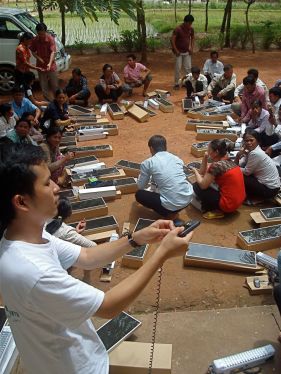Archive for August 8th, 2011
Community Malaria Workers Use SMS to Report in Real-Time

Malaria Consortium’s Ngor Pengby demonstrating how to charge a mobile phone using a solar panel. This project is in collaboration with Mobitel.Photo by WHO/Moeun Chhean Nariddh
Moeun Chhean Nariddh reports on a mobile phone-based frontline reporting system for detected malaria cases, implemented in Kampot province.
From her house in Snay Anchit Village, about five kilometers from the health center in Kampot provonce’s Chum Kiri district, 20-year-old village malaria worker Kong Lida can clearly hear the noise of a generator roaring in the distance. This generator is an important source of power where Lida and other villagers have their car batteries charged everyday so that their houses can be lit up at night from electric lamps and at the same time charge up their mobile phones.
But soon Lida and other village malaria workers in her village and other communes will not need to pay the generator owner to have their car batteries charged anymore. Now, all these VMWs will get their power from a ubiquitous source of energy – namely solar power.
As part of the country’s malaria elimination strategy, the National Center for Parasitology, Entomology and Malaria Control or CNM, with technical support from Malaria Consortium (MC) and WHO, has launched a pilot program to train VMWs in Kampot, Siem Reap and Kampong Cham provinces on how to send simple mobile phone text messages (SMS) to report in real time on detected malaria cases. These SMS messages also support the paper reporting that feeds into the health information system from the health centers.
CNM and MC also provide each of the VMWs with a solar panel and a lamp together with a mobile phone and a charger since there is no electricity in their villages.
Cambodia is currently seeing a revolution in communications with the roll-out of affordable wireless services to much of the rural population. The potential of approaches based on mobile phones and web-based technology to address the gaps in field data collection for malaria is now widely recognized.
“I think using a mobile phone is good, because I can report immediately when I come across a malaria case,” said village malaria worker Lida. Previously, the VMWs would record the data in a logbook which they would then report to the health centers at the end of every month before it was sent to the operational district hospitals and finally to CNM.
InSTEDD, an innovative humanitarian technology NGO, designed the system, utilizing SMS messages in Khmer script that interact with mapping software to generate maps on the World Wide Web for the locations of malaria cases reported by the VMWs. These malaria cases are also known as Day Zero cases, to indicate the locations of the patients before they are given appropriate and effective treatment.
